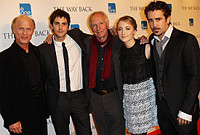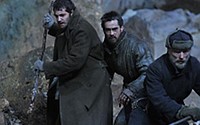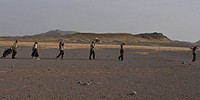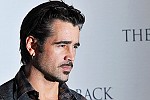 The hard way
The hard way Peter Weir puts Jim Sturgess, Colin Farrell, Ed Harris and Saoirse Ronan through their paces • Page 2 of 2

At the premiere: Harris, Sturgess, Weir, Ronan and Farrell


ED HARRIS
28.Nov.50 • Tenafly, New Jersey




JIM STURGESS
16.May.81 • London




SAOIRSE RONAN
12.Apr.94 • New York City






 Was it sad to have to leave the group when you did?
Was it sad to have to leave the group when you did?Colin: I was fairly ready, to be honest with you. I was pleased to kick Valka to the curb. There was no love, there was no hope, there was no anything in his life. Nor was he mournful or melancholy as a result of that. He's a very strange fellow, so it was fine leaving him behind. I wouldn't have minded going to Morocco, because I do like the desert, and I wouldn't have minded having a pot of tea in Darjeeling. But it wasn't to be, alas!
What was the hardest scene for you, Jim?
Jim: That's an easy one. We were out in the desert and I had food poisoning. Ed and I got it at the same time, and I think Saoirse got it too. The Moroccan desert was, for me, harder than filming up in the cold in the mountains of Bulgaria. When we first started filming, I was kind of dreaming of getting to Morocco; that was our light at the end of the tunnel. And then of course we got there and it was twice as hard as being in the snow. Out in the blistering heat, climbing a sand dune, running for some water. There was the scene where we were running to the well and I was really, really sick that day. I had stomach cramps and needed the toilet every five minutes. Out in the middle of nowhere. So it wasn't just one of the hardest days of the shoot, but one of the hardest days of my life.
Did you get food poisoning too?
Saoirse: Yes, it was one of my last days and I just felt awful. It was maybe 45 degrees or something like that. There's a nice shot where I'm sleepwalking and I keep my eyes closed, try and figure out where I was and walk forward and try not to bump into the camera or anything. And I had this horrific pain in my stomach the whole day. So that was the toughest for me. But it was still a great shoot, besides that one day.

We were all kind of raw. We were all out there every day doing these things.
Jim: I'd take real snow any day over that.
Did the physical difficult help with the emotional scenes?
Ed: Any scene that did have an emotional content to it, it was just there. We were all kind of raw. We were all out there every day doing these things. Even though we had little tents for shade or a little heater to try to get warm, it was still demanding on a physical level, which was great. But what that does is kind of open you up a little bit and expose you. You feel like a raw nerve, so any time there was an emotional aspect to a scene or some personal expression of something, it was pretty much at your fingertips. Or at least it felt that way to me. My worst day when I was sick was with a big wide shot and we were going up the biggest sand dune of the whole film, and Jim and I are dragging this sled up there. I couldn't even stand up; I was so weak and I hadn't been keeping anything in. Peter was kind enough to let me go take a little break at some point that day for a couple of hours, because I couldn't stand up. We were dragging that thing up that hill, thinking, "Just say 'cut'!" I didn't care how far away we were, about 200 yards that way. We were doing our best, out there walking, you know. And he did say "cut" at some point.
What about you, Colin?
Colin: The thing I found the hardest was the inaction - or seeming inaction. You were always in action walking or even sitting and twirling the knife around. But it came to pass that each actor would have his moment, or his scene, every four or five days. It would be Jim's turn or Ed's turn, or Valka would chime in and say something that was more than a grunt. So that was stuff we looked forward to. But we all had to be there, of course, at all times, and the camera was constantly searching and looking into the group from behind, from the side, from the front, and there were days on end where you had nothing to do but walk. But you had to stay focused and stay close to whatever you deemed was your character's gait and where your character's thoughts went. It was the trickiest thing, because I personally love to be active, I love to be involved and expressing or attempting to suppress expression or whatever. So it was an exercise in the patience of just being. It was intense.

I had to resist the deep urge to get Stalin engraved on my chest
Colin: Yes, I had to resist the deep urge to get Stalin engraved on my chest! No, there's an incredible significance to every single drop of ink that appears on any of these men's bodies, much more so than a couple of drunk markings I have of various nights in the last 15 years on my body! But each single tattoo referenced either a crime committed, an amount of time done or a particular standing one held within the criminal infrastructure, so it was fun. Again, it was something that was very foreign to me, very exotic, as was the accent and the language. So it was just another conduit into Valka. Peter gave me a couple of books that had a lot of the tattoos that were used. I went through them and designed Valka's torso. It took at the start about an hour and a half to apply and by the end the make-up artist had it down to about 25 minutes. He was pretty handy.
What do you think the main message of the film is?
Peter: If I had to reduce it down its essence I could almost put it on stage with this wonderful group of actors and have moving backdrops behind them, with mountains and deserts - it was the human spirit. These were ordinary people. That's why the whole film is structured without the conventional cliffhangers, pursuing soldiers and wicked commandants or whatever. It was a real as I could get it. And they played it that way. I loved pointing a camera at each one of them.
CLARIDGES, LONDON • 8.DEC.10
HOME | REVIEWS | AWARDS | NEWS | FESTIVAL | Q&A | ABOUT | TALKBACK